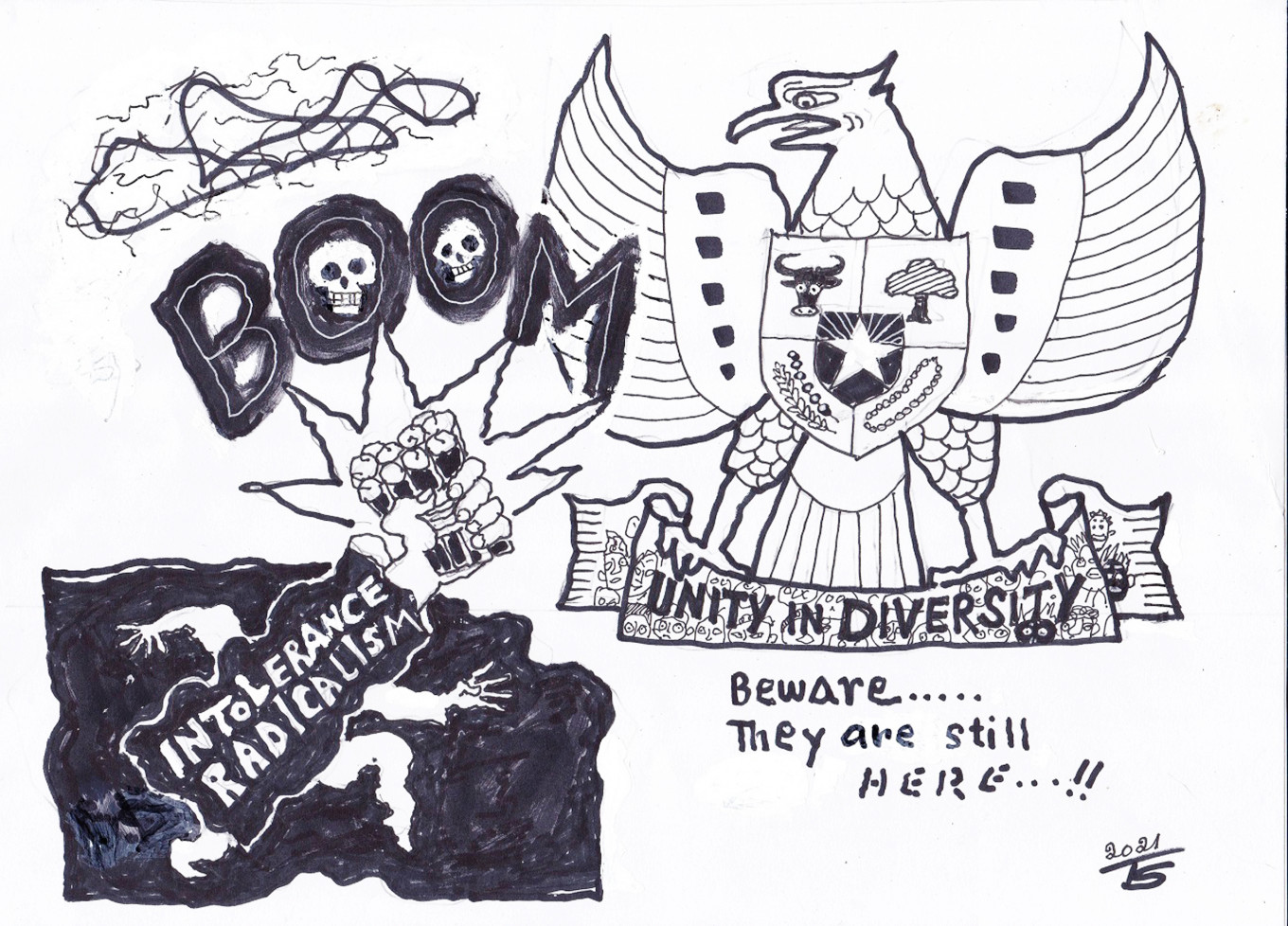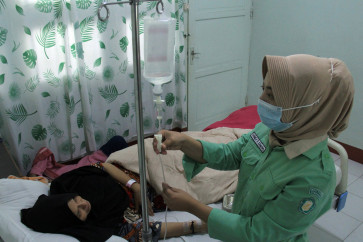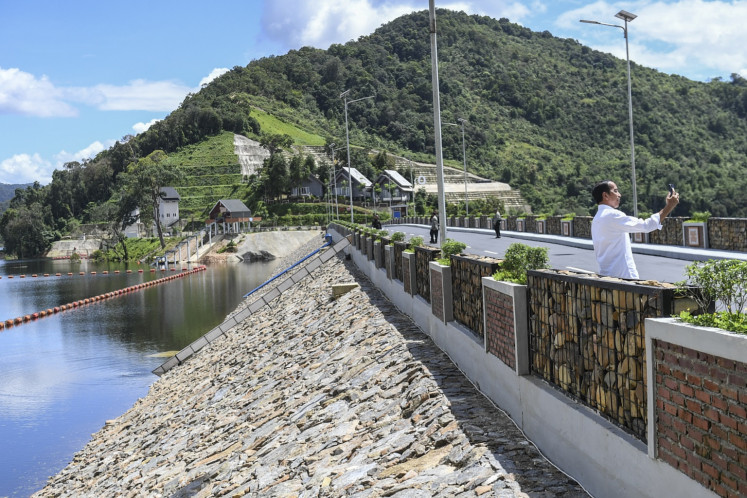Anti-terror efforts should look at Jolo-Makassar links
Many of these new young terrorist operatives, like Mundi and Andi, are not as seasoned as JI operatives like Dulmatin and Abdurrajak Janjalani.
Change Size

T
he recent suicide bombing in Makassar has again highlighted the regional dimension of the ongoing terrorist threat in Indonesia. For a few years, Makassar has been a hub for terrorist groups to recruit operatives in the Philippines or Indonesia.
The first known attack linked to this nexus took place on Jan. 27, 2019, when Rullie Rian Zeke and Ulfah Handayani Saleh, an Indonesian couple from Makassar, carried out a suicide bombing at the Our Lady of Mount Carmel Cathedral on Jolo island in the southern Philippine province of Sulu.
The couple did not carry out the attack alone, as Rullie and Ulfah received logistical support from a local terrorist group led by Hatib Hadjan Sawadjaan. The connection was made through Andi Baso, an Indonesian national and member of the Jemaah Ansharut Daulah (JAD) terror group, who guided the couple from the end of their mandatory deradicalization program through to their jihad “mission” in the southern Philippines.
Interestingly, after it was confirmed that Rullie and Ulfah were Indonesian nationals who had once tried to reach Syria and join Islamic State, the Indonesian and Philippine authorities discovered that Indonesian nationals Andi, his wife Rezky Fantasya and Rezky’s siblings Ibrahim, 11, and Aisyah, 9, were still wandering around Patikul, a village in the Sulu archipelago that is known for harboring several local terrorist groups, including factions that were sheltering foreign terrorist fighters (FTFs).
Authorities had been progressively identifying this pattern for a few years and Andi might have played a major role. During his time with terrorist groups in Patikul, Andi had developed strong ties with local residents who spoke Malay, including Mundi Sawadjaan, who succeeded Hadian after he was killed in July 2020. Andi also communicated with his contacts in Makassar, asking them to regroup, train and prepare themselves in case they could cross the border to join him in the southern Philippines.
From this perspective, what was considered a terrorist cell in Makassar was getting ready to wage jihad, either in Indonesia or by joining Andi in Sulu. Meanwhile, the families of Indonesian FTFs were financially supporting their operations from Indonesia. This was the case with Rezky’s family in Makassar, who sent funds to support her and Andi.
The network that was involved in the two bombings were identified and tracked by following Andi and his entourage. One of Andi’s close friends, Sanjai Azis, had already made an attempt to cross the border from Kalimantan to Sabah in 2019, but had to return to Makassar because he lacked funds and found it impossible to reach Sulu.
In Makassar, Sanjai and several friends, including Rezky’s sister, had formed a group and regularly conducted idad (training and Islamic studies). For them, Rullie and Ulfah’s amaliyah (attack) was successful and the rest of group should follow up.
Meanwhile, Andi strengthened the group’s jihad ideology via online messaging. Through this interaction, Andi was able to intensify cross-border relationships by building the same motivation and vision among the Jolo and Makassar groups. At some point, the group Mundi led, Jemaah Tanum, acknowledged its cooperation with JAD, which led to changes in its modus operandi.
The Makassar cathedral bombing might seem unprecedented, but it has actually confirmed a pattern developed by the ties between these two networks. Before Rullie and Ulfah’s suicide bombing, the terrorist groups in Jolo had never targeted Christians or churches. It is even more important to note that suicide bombings are very rare in Jolo.
The group’s main target also shifted. Like JAD, the operations of most terrorist groups in Jolo targeted the military, the police and their facilities. In parallel, in a trend that can be seen globally, women have become more active as perpetrators, while civilians and religious symbols have become the target of suicide bombings.
This new trend has become widespread in the southern Philippines, thanks to the relationship between the two groups. The Indonesian National Police’s Densus 88 counterterror squad has quickly identified the perpetrators of the Makassar cathedral bombing, stating that they were part of JAD and were linked to the Jolo church bombings. It seems clear that this attack was inspired by the legacy of Andi, who was killed last year in Patikul, and the links he managed to create across the border.
Rezky was arrested by authorities last year while attempting to carry out a suicide bombing in Jolo, which emphasized the shift in the modus operandi. Additionally, the couple responsible for the Makassar bombing sympathized with the death of Sanjai, who was killed during a Densus 88 raid this February.
The counterterror squad has also arrested Ainun, one of Rullie and Ulfah’s daughters and sister to Rezky, which has triggered more wrath among the group linked to the Makassar bombing to take immediate action before they are also arrested.
While some observers argue that this cross-border pattern is an old one, there are actually major changes that should be taken into account to tackle transnational and regional terrorist threats.
An understanding of the networks that exist between the two countries is essential. This even more urgent, as these networks are developing into a new organizational structure, with several new operatives that are totally different from what security agencies might have understood from their experience with Jemaah Islamiyah (JI) in the southern Philippines.
As a matter of fact, many of these new young terrorist operatives, like Mundi and Andi, are not as seasoned as JI operatives like Dulmatin and Abdurrajak Janjalani, who developed a close relationship when they fought and trained together in Afghanistan. Mundi and Andi relied on a different relationship that was built under bai’at (pledge of loyalty) with IS.
In this perspective, the counterterror approach should take into account that networking such as that seen between Jolo and Makassar could lead to more terrorist acts like the Makassar church bombing, despite their limited mobility.
***
Ulta Levenia is lead researcher on terrorism at the Galatea think tank on Southeast Asia and a consultant at Semar Sentinel; Alban Sciascia is a writer for Galatea and director of Semar Sentinel.









